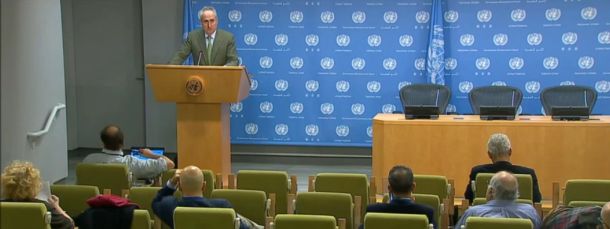
Here is the Saharawi people’s contribution to the global fight against climate change, presented at a side-event of COP26 today.
Above: The Saharawi refugee camps in Algeria are regularly affected by floodings, sand storms and extreme heat.
The Saharawi Arab Democratic Republic (SADR) has today launched an indicative Nationally Determined Contribution (iNDC) for Western Sahara, outlining what actions it intends to undertake to contribute to global efforts to address the climate crisis.
The launch coincides with the COP26 negotiations in Glasgow, from which the Saharawi people and their government are excluded as a result of Morocco’s illegal occupation of their homeland and the UN’s failure to resolve the conflict in line with the governing principle of self-determination.
The iNDC identifies measures that can be taken immediately, and further action that is subject to the territory’s decolonisation. It furthermore highlights the need for the Saharawis to be able to access climate governance and finance mechanisms.
Read the full iNDC for Western Sahara here, launched at a side-event of COP26 today.
Morocco militarily occupies three quarters of Western Sahara. Its claims to the territory have been refuted by the International Court of Justice and other courts around the world including the EU Court of Justice, as well as by the UN, which considers Western Sahara a non-self-governing territory - a colony.
“Not only are our people subjected to a brutal occupation, they are also at the frontlines of the climate crisis”, says Mr Adda Brahim, Minister of Environment and Water Resources of the Sahrawi government. “We have no time to waste. Our iNDC identifies actions that can be taken under the current circumstances, and actions that can be taken once the UN-manded decolonisation process is complete. Above all, it highlights our need to be able to access climate finance and participate in climate governance mechanisms including negotiations, in line with principles of climate justice set out in the Paris Agreement. We ask for full participation in UNFCCC processes, including the submission of formal NDCs, whose development should be supported through the same financial and technical assistance mechanisms that are open to other vulnerable developing countries.”
Under the Paris Agreement, Parties should submit climate plans - called Nationally Determined Contributions (NDCs) - that include targets, policies, measures and contributions to global climate action. The SADR thus has no obligation to develop an NDC.
Despite the international rejection of Morocco's occupation of the territory, Morocco has exploited climate finance and governance mechanisms to position itself as a climate leader and strengthen its occupation, including Western Sahara in calculations of its territorial emissions and planned mitigation and adaptation actions.
Morocco's false reporting to the UN, and its development of alleged ‘green’ infrastruscture in occupied Western Sahara was documented in the October 2021 report by WSRW, 'Greenwashing Occupation'.
The Saharawi people, on the other hand, both those living under occupation, or as refugees, are excluded from the same international climate finance and governance mechanisms from which occupying Morocco benefits. The elected Saharawi government cannot access international climate finance or technical support that would allow its people to adapt to the worsening impacts of the climate crisis, because Morocco continues to block any progress in the UN-monitored peace process.
While bearing close to no responsibility yet some of the worst impacts of climate change, the people of Western Sahara have no voice in the UN system set up to coordinate efforts to strengthen resilience to climate stresses and shocks. The Saharawi people falls between all chairs in international climate talks.
“Global climate governance systematically favours Morocco while excluding the SADR, helping Morocco strengthen its occupation while denying the Sahrawi the means to confront the climate crisis”, says Nick Brooks of Garama 3C Ltd, which supported the development of the Sahrawi iNDC. “Not only is this a case of extreme climate injustice, it is a literal example of climate colonialism.”
“In developing and launching its iNDC, the Saharawi government demonstrates its willingness to cooperate globally in facing one of the worst crises of our lifetime, and at the same time champion climate justice”, says Sara Eyckmans of Western Sahara Resource Watch. “The Saharawi people are prepared to do their share to address climate change, but need to be included in the international processes that will allow them to do so.”
Since you're here....
WSRW’s work is being read and used more than ever. We work totally independently and to a large extent voluntarily. Our work takes time, dedication and diligence. But we do it because we believe it matters – and we hope you do too. We look for more monthly donors to support our work. If you'd like to contribute to our work – 3€, 5€, 8€ monthly… what you can spare – the future of WSRW would be much more secure. You can set up a monthly donation to WSRW quickly here.
UNFCCC seeks answers from Morocco on parliamentarian expulsion
A spokesman for UNFCCC told media that it has requested answer from the organisers of COP22 on why they kicked out the vice-president of the PanAfrican-Parliament.
COP22: Ban Ki-Moon raised Moroccan propaganda with UNFCCC
Moroccan Foreign Affairs Minister namedrops invasion at COP22 opening
Morocco's minister of foreign affairs - as expected - today propagated about his country's occupation of Western Sahara during the opening statement of COP22.
Morocco relaunches COP22.ma site - propaganda map is gone
On the evening of 6 November 2016, the day before the opening of the climate talks in Marrakech, the official website COP22.ma is relaunched. False map is gone.

